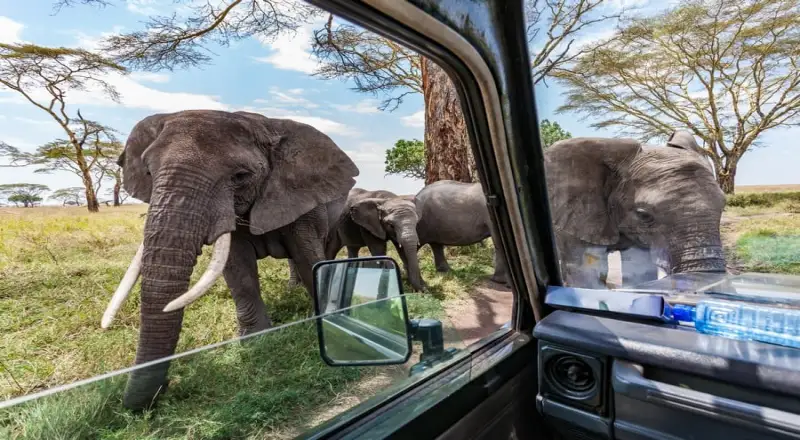
The Serengeti National Park is a large national park in northern Tanzania that stretches over 14,763 km2 (5,700 sq mi). It is located in eastern Mara Region and northeastern Simiyu Region and contains over 1,500,000 ha (3,700,000 acres) of virgin savanna. The park was established in 1940. The Serengeti is well known for the largest annual animal migration in the world of over 1.5 million blue wildebeest and 250,000 zebra along with smaller herds of Thomson's gazelle and eland. The national park is also home to the largest lion population in Africa.
Ruaha National Park is a national park in Tanzania. The addition of the Usangu Game Reserve and other important wetlands to the park in 2008 increased its size to about 20,226 km2 (7,809 sq mi). The park is about 130 kilometres (81 mi) west of Iringa. The park is a part of the 45,000 square kilometres (17,000 sq mi) Rungwa-Kizigo-Muhesi ecosystem, which includes the Rungwa Game Reserve, the Kizigo and Muhesi Game Reserves, and the Mbomipa Wildlife Management Area.
Ngorongoro Conservation Area is in northern Tanzania. It’s home to the vast, volcanic Ngorongoro Crater and “big 5” game (elephant, lion, leopard, buffalo, rhino). Huge herds of wildebeests and zebras traverse its plains during their annual migration. Livestock belonging to the semi-nomadic Maasai tribe graze alongside wild animals. Hominin fossils found in the Olduvai Gorge date back millions of years.
Katavi National Park is a Tanzanian national park created in 1974 and is located in Katavi Region, Tanzania. It is a very remote park that is less frequently visited than other Tanzanian national parks.
Sabi Sand Game Reserve is located adjacent to the Kruger National Park in the Lowveld of Mpumalanga, South Africa. Officially named Sabi Sand Wildtuin, the Sabi Sand Game Reserve consists of a group of private game reserves.
South Luangwa National Park is in east Zambia’s Luangwa River valley. It’s known for its abundant wildlife. Inside the Mfuwe Gate entrance, the river is often crowded with hippos. The woodland savannah is home to hundreds of bird species. Trails from the park’s lodges wander past baobab trees, herds of elephants and rare Thornicroft’s giraffes.
The Okavango Delta is a vast inland river delta in northern Botswana. It's known for its sprawling grassy plains, which flood seasonally, becoming a lush animal habitat. The Moremi Game Reserve occupies the east and central areas of the region. Here, dugout canoes are used to navigate past hippos, elephants and crocodiles. On dry land, wildlife includes lions, leopards, giraffes and rhinos.
Chobe National Park is in northern Botswana near the vast, inland Okavango Delta. It's known for its large herds of elephants and Cape buffalo, which converge along the Chobe Riverfront in the dry months. Lions, antelopes and hippos inhabit the woods and lagoons around Linyanti Marsh. The floodable grasslands of the Savuti Marsh attract numerous bird species, plus migrating zebras.
Moremi Game Reserve is in northern Botswana, in the Okavango Delta, which becomes a lush animal habitat during seasonal floods. Dugout canoes are used to navigate past birdlife, hippos and crocodiles on waterways like the Xakanaxa Lagoon. On land, wildlife includes lions, leopards and rhinos. Safari camps are common, with several dotted around large Chief's Island and the forested Mopane Tongue Peninsula.
Maasai Mara National Reserve is an area of preserved savannah wilderness in southwestern Kenya, along the Tanzanian border. Its animals include lions, cheetahs, elephants, zebras and hippos. Wildebeest traverse its plains during their annual migration. The landscape has grassy plains and rolling hills, and is crossed by the Mara and Talek rivers. The area nearby is dotted with villages (enkangs) of Maasai people.